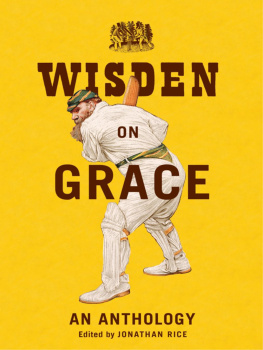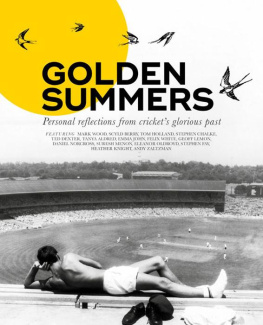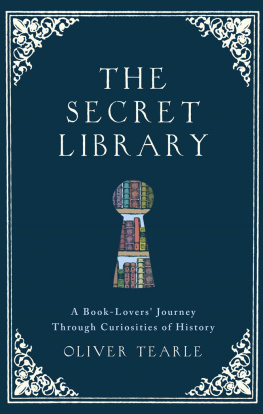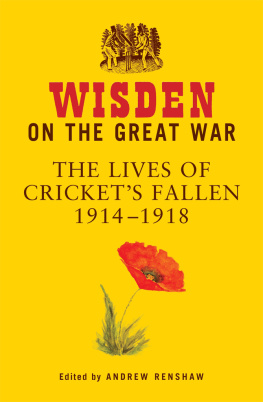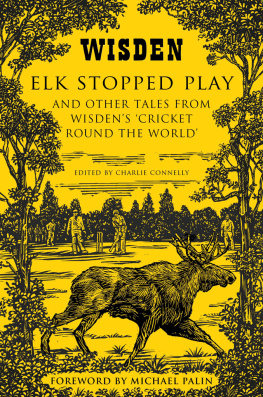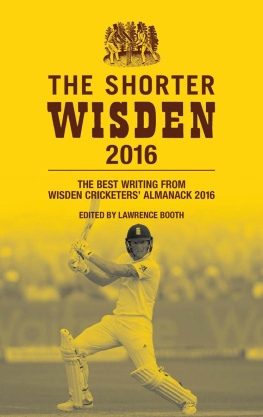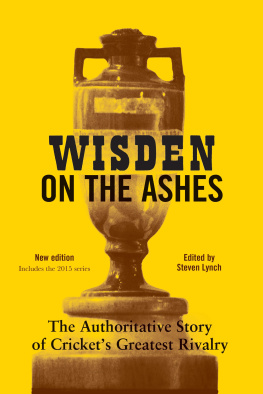To Peter and Norman, whose paternal influence
inspired a love of cricket and yellow-covered books

First published in Great Britain 2013
This electronic edition published in 2013 by Bloomsbury Publishing Plc
Copyright 2013 by John Wisden and Co
The moral right of the author has been asserted
No part of this book may be used or reproduced in any manner whatsoever without written permission from the publisher except in the case of brief quotations embodied in critical articles or reviews
All rights reserved
You may not copy, distribute, transmit, reproduce or otherwise make available this publication (or any part of it) in any form, or by any means (including without limitation electronic, digital, optical, mechanical, photocopying, printing, recording or otherwise), without the prior written permission of the publisher. Any person who does any unauthorised act in relation to this publication may be liable to criminal prosecution and civil claims for damages.
Bloomsbury Publishing Plc
50 Bedford Square,
London WC1B 3DP
www.bloomsbury.com
www.wisden.com
Bloomsbury Publishing, London, New Delhi, New York and Sydney
A CIP catalogue record for this book is available from the British Library
eISBN: 978-1-4081-7897-3
To find out more about our authors and their books please visit www.bloomsbury.com where you will find extracts, author interviews and details of forthcoming events, and to be the first to hear about latest releases and special offers, sign up for our newsletters here.
Contents
To the Reader
______
In offering our first edition of the Cricketers Almanack to the patrons of the Noble Game, we have taken great pains to collect a certain amount of information, which we trust will prove interesting to all those that take pleasure in this glorious pastime. Should the present work meet with but moderate success, it is intended next year to present our readers with a variety of other matches, which the confined nature of an Almanack precludes us from doing this year.
JOHN WISDEN & Co., 1864
From the 1993 Preface (Matthew Engel)
The most revered tradition of Wisden is its accuracy and I feel as bound to uphold that as if on oath. Inevitably, a volume of this size, produced under pressure, must contain some mistakes. All one can say is that the effort put into eliminating errors is as exhaustive (and exhausting) as the combination of the fallible human brain and the even more fallible computer can achieve.
There are other traditions that are just as sacred: Wisdens continuity and its independence from crickets ruling bodies so that it remains free to comment robustly on the issues the game faces. Whoever temporarily carries the torch has to maintain these.
The Reduced Shakespeare Company are an American acting troupe who have been condensing literary and theatrical great works since 1981. One of their productions, in 1995, was entitled The Bible: The Complete Word of God (abridged). Comedy, as well as brevity, is their stock in trade, and while The Essential Wisden is ploughing a more serious furrow albeit with a sprinkling of light-heart-edness there have been many occasions during the books lengthy construction when a sense of humour has been the best assistant in undertaking the monumental project of producing what might be termed The Bible of Cricket (abridged) in a single volume. Wisden Cricketers Almanack has been mined before, but we hope to have unearthed a few gems previously untouched.
In its 150 years Wisden has published 133,491 pages. We have been able to extract less than one per cent of that content. Lack of space is, it seems, a perennial thorn in Wisdens side. The report in the 1881 edition of the first Test match to be held in England begins: The compiler much regrets that the limited space allotted to the Australians matches in this book precludes the possibility of giving a lengthened account of this famous contest. As the game has expanded its horizons so has Wisden, and trying to keep the books girth from reaching W. G. Grace-like proportions has been a major, oft-expressed headache for every editor.
The title of this book reflects that what we have produced is the essence of Wisden, the edited and abridged highlights of an annual which has moved from modest beginnings to become the foremost sporting publication of its type, filled with comment and good writing to accompany its primary task of recording the major cricketing happenings of the preceding year and the games primary records. The founder declared coyly in 1864: We of course make no comments upon the matches since a great many of our readers are at least equal, if not superior, to ourselves in arriving at a right judgment. In fact, Wisdens readers have for many years since turned to it for informed opinion and for almost every cricket researcher it is the initial point of reference.
The first 112-page edition contained, alongside some cricket, information on the modern tea-table, the nobility of England, a list of Derby and other Classic race winners, the rules of bowls, and the dates of the Crusades. As one small sign of how far it has come in the meantime, its most recent 1,584-page incarnation after 150 years of continuous publication, outlasting its many Victorian rivals and surviving German bombs in the Second World War has an article by an England wicketkeeper coming out as gay, and another headlined Headscarved heroines about the female cricketers of Afghanistan. The breadth and depth of Wisden is breathtaking. All cricket life is between its pages, as is plenty that has only a tangential relationship with the summer game. A look at the Obituaries section is testament to that.
Our book makes no claim to be a history of cricket. It would be impossible to do that even if we had the space to attempt it. Heretical though it might be to say, Wisden, for all its rigour, has omissions, inaccuracies and prejudices. These are easier to observe with hindsight, of course. For example, the first two Australia v England matches in 1877, subsequently acknowledged as the first Test matches, were unreported. Incidents of major significance, in or around a match, were sometimes ignored altogether or referred to with frustrating euphemism; as a result, our selection or omission of some material has been influenced by the lack of quality of the original reports or articles.
While Wisden might seem to the casual observer to represent an old guard, it is anything but. It has always had strong opinions and has used them to present an alternative future, rather than retrench a conservative position. In 1997, two years after making the initial proposal, Matthew Engel established the Wisden World Championship, which he believed offers the chance to ignite interest in Test matches even among non-cricketers and could secure the future of the traditional game. It was the precursor to the ICCs Test rankings that are an accepted part of the five-day games narrative today.
We have done our best to provide a fair representation of the span of time, the great players and the great moments in the game. The selected extracts are, of necessity, snapshots, of how Wisden saw an event, issue or individual in the year of publication. Wisden has always been unashamedly an Anglocentric publication, with the county game and the fortunes of the England team substantial planks on which each edition is built. Our structure reflects that emphasis. Cricket in all parts of the world has been given increased and deserved prominence in recent years, but
Next page

